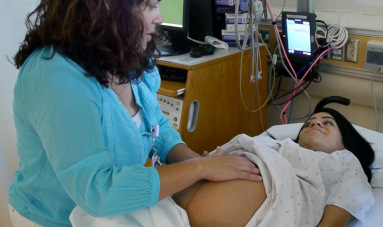
"Natural childbirth" has many definitions. Some women think of it as vaginal delivery with no pain medication, C-section, forceps or other assistance. Others count any vaginal delivery, even with an epidural or nitrous oxide (laughing gas) to “take the edge off.”
However you define it, the certified nurse midwives (CNMs) at UNM Hospital are here to help. We specialize in natural childbirth, from the start of labor through recovery.
Most women can safely have a natural childbirth, and there are many options for support and pain management, including our one-of-a-kind Birth Companion Program.
Successful natural birth starts with being open to change. In many areas of life, women pressure themselves to meet high expectations from friends, family or themselves. But childbirth is no time to compare yourself to others—or to what you hoped would happen.
Nature doesn't always go along with our plans, and every delivery is different. Some babies are born after a longer (or shorter!) than expected labor. Sometimes emergencies happen. And every woman has different preferences for managing pain. Like I tell my patients, I don’t live in your body, and I haven't had your life experiences.
You deserve to know your options—and to change your birth plan as needed. We are here to inform and support your decisions through the birth process. We all share the same goal: a healthy mom cuddling her baby after birth.
In that spirit, let's talk through your options for support and pain management in natural childbirth
Support Options for Natural Childbirth
Studies show that having a labor support person can be key to successful natural birth. A 2017 study found that continuous labor support can reduce:
- Labor pain
- Length of labor
- Rates of C-section, forceps or vacuum-assisted birth
- Request for epidural
Many moms-to-be ask their partners to be their support person. But not every partner can empathize with her needs. And some struggle watching their loved one experience pain they can't fix or control. Their anxieties can make it tough to be a supportive caregiver to the mom. So, we've made it a priority to offer all our patients a labor support person at no extra cost to them.
Certified Nurse-Midwives
CNMs specialize in caring for patients with low-risk pregnancies, from prenatal through postpartum care. We are medical experts who focus on giving women choices to make informed birth decisions.
Your midwife will listen to you, encourage you and help you pivot your birth plan preferences as needed. Our goal is to provide you with as much hands-on support as possible. Because we may have more than one patient in labor, we also depend on our expert labor nurses to support you. If an emergency happens, the OB/GYN doctors and our nurses are always available to help us take care of you.
Birth Companions
We are the only hospital in New Mexico to offer the Birth Companion Program—a free labor support service for UNM patients. Birth companions are not doulas. They are trained volunteers who encourage and support any mom who needs it during labor and delivery.
You do not have to sign up for the program in advance. Birth companions are available 24/7 at UNM Hospital, even during the pandemic. Just let us know you want a support person and we'll reach out for you. Because of the pandemic, our birth companions are offering virtual support via Zoom and will be back in the hospital as conditions improve.

Related Reading
Who Should be in the Delivery Room? How to Choose the Best Labor Support Person
Pain Management Without Medicine
Bathtub or Shower
All laboring women at UNM Hospital have access to bathtubs or showers in our delivery unit. Sitting or standing in the warm water can help relax you and can soothe the pain.
Exercise Balls
A round, inflatable exercise ball is a low-tech pain management option. The rocking motion can be soothing. Moving on the ball also helps get the baby’s head in position for delivery—the baby's head has to shift around your pelvic bones so you can deliver.
I describe it to patients like putting shoes on a toddler. If a child is asleep, their leg is limp and they can't help move their foot into the shoe. But if they are awake and can wiggle their foot, getting the shoe on is easier.
We also offer large peanut-shaped balls for women to use while lying down. The ball lifts the hips and open the pelvis, helping the baby descend. This is a comfortable option for women who have to stay in bed during labor, such as after an epidural is placed.
Medical Pain Management
Nitrous Oxide
Also known as laughing gas, nitrous oxide can help you worry less about labor pain. If you choose nitrous oxide, we will give you a small mask. You'll breathe deeply and inhale the medication.
This medication also offers natural elements, since deep breathing alone is helpful to relieve pain. During the COVID-19 pandemic, we are not offering nitrous oxide for labor pain management. Once the pandemic subsides, we will offer it again.
Intravenous (IV) Medication
This is another option to dull, but not completely eliminate, labor pain. Your CNM or OB/GYN will prescribe the medication, and your nurse will give it to you through an IV in your arm. IV medication can make you and the baby sleepy, and it might make you a little nauseous.
Epidural
Epidurals block most of the pain of childbirth. It numbs your body from the waist down. You will still feel pressure in your abdomen and pelvis, but it won't hurt.
The anesthesiologist doctor will place a thin tube called a catheter into your spine. Medicine flows through the catheter to block the nerves in your back. Some patients fall asleep because their pain is fully relieved.
Once you have the epidural, you will have to stay in bed. You'll get a pump so you can control how much medication you get. The pump is designed so you can't accidentally give yourself too much.
Epidurals usually work well but not every woman has complete pain relief. You will still feel pressure and maybe even pain as the baby is coming out. After the baby is born, the nurse will remove the catheter. Once the numbness wears off, the nurse will help you get up, walk around and use the bathroom.
Interestingly, more patients than usual have asked for epidurals during the pandemic. Life is tough right now, and many of them say they've already dealt with enough discomfort this year.
Planning Your Natural Birth
Every birth and every woman is different. Whether you are having your first baby or fifth, it's important to think about the labor and delivery you want to have—and always remember that things may go differently!
If you’re thinking about trying natural childbirth, talk with your CNM or OB/GYN. We'll help you consider your options and make a plan— and then plan to change your plan, if necessary.
Schedule an Appointment
Schedule a time to discuss exercise options with your OB/GYN provider. Call 505-272-2245 today.

